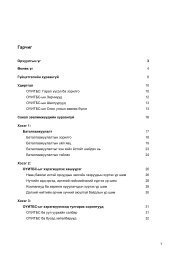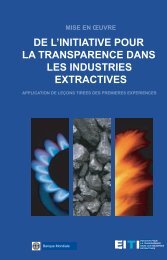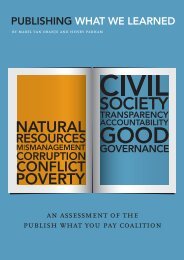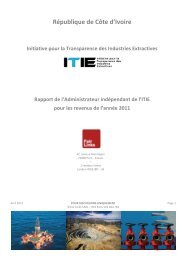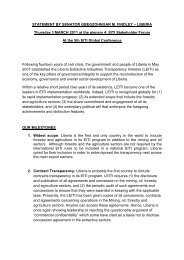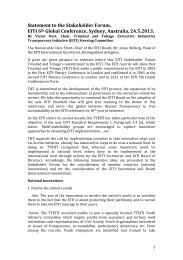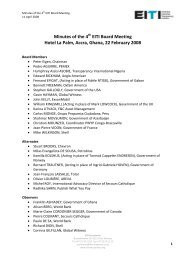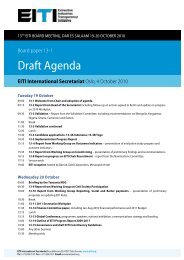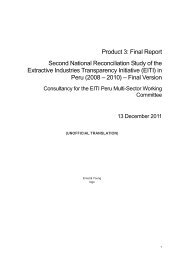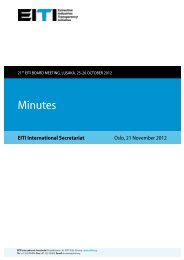Vietnam feasibility study - EITI
Vietnam feasibility study - EITI
Vietnam feasibility study - EITI
Create successful ePaper yourself
Turn your PDF publications into a flip-book with our unique Google optimized e-Paper software.
64<br />
vI.4 - cOnclusIOn<br />
In recent years, mineral resources, especially oil and gas, have greatly contributed to the economy<br />
(accounting for 11% of GDP) and created more employment for society. The extractive industry not<br />
only provides essential inputs for other industries but also stimulates many ancillary industries and<br />
ensures national energy security. Contribution of the extractive industry continues to increase with<br />
the high growth rate of the national economy and an increasing globalization.<br />
<strong>Vietnam</strong> has been discovering many large mineral reserves, which are not only positive for the<br />
development of the extractive industry but also the national economy. However, along with this<br />
development, mineral extraction activities cause significant negative impacts to the environment,<br />
culture and society, especially in mining areas. Moreover, the State has suffered significant revenue<br />
losses because the management of mineral resource and as well as of the extractive industry has been<br />
poor throughout the years. Illegal exploitation, mineral smuggling, and tax evasion also commonly<br />
occur in many areas. On the other hand, the management and use of revenues has many constraints<br />
and lacks transparency. To assure benefits from mineral resources (including oil and gas) contributing<br />
to national wealth, <strong>Vietnam</strong> should strengthen its supervision and management and be more<br />
transparent in the EI sector.<br />
<strong>Vietnam</strong> has recognized the importance of transparency to the development of the country. The<br />
openness and transparency of information in <strong>Vietnam</strong> has been mentioned in many legal documents<br />
and policies of the Party and State, as well as in the international commitments of <strong>Vietnam</strong>, such<br />
as in the Law on Enterprises, Law on Prevention of Corruption and Anti-Corruption, Conventions<br />
of the United Nations and so on. However, corruption is still complicated and there is no trend<br />
in remission 14 . To prevent corruption as well as minimize the influence of interest groups in the<br />
extractive industry, apart from state management tools, the extractive industry needs to apply new<br />
management tools, in which the participation of stakeholders, especially communities, needs to be<br />
strengthened. That “mineral resources belong to the people” has been recognized in the national<br />
Constitution and the Law on Minerals, so that people must be involved in the oversight and decision<br />
making to ensure the benefits from “nature’s gift” for the common development of the nation. One<br />
of the approaches being applied by 35 countries around the world, which has initially obtained<br />
positive results, is the Extractive Industries Transparency Initiative.<br />
The implementation of <strong>EITI</strong> has brought many benefits to the implementing countries such as drawing<br />
a huge amount of money, reducing social tensions and conflict between relevant bodies through<br />
dialogue mechanisms, creating a fair competitive investment environment between the parties, and<br />
strengthening national credit ratings in the eyes of the international investors. The lessons about the<br />
benefits of implementing <strong>EITI</strong> are reflected quite clearly in some very different countries like Nigeria,<br />
Ghana and Norway. Commitment and support from many countries and organizations around the<br />
world has shown that <strong>EITI</strong> is one of the most effective and useful approaches in mineral resource<br />
management. Transparency is an urgent need for a flat world 15 where the globalization process is<br />
rapidly taking place and countries must follow the global rules of integration and development.<br />
<strong>Vietnam</strong> has reached the threshold of a middle-income country whose average GDP growth is above<br />
7% per year over the past decade. An increasing demand for minerals to serve domestic consumption<br />
*14: According to the Transparency International, <strong>Vietnam</strong> was ranked as 116th in 178 countries/territories about Corruption<br />
Perception Index in 2010. Source: http://www.transparency.org/policy_research/surveys_indices/cpi/2010/results<br />
*15: The term Flat world is coined by Thomas L. Friedman in the book The World is Flat: A Brief History of the Twenty-First Century<br />
implying a rapid globalization in the modern world in which the countries around the world are getting more dependent on each<br />
other in the global economy.<br />
The Extractive Industries Transparency Initiative and the Implementation Perspective of <strong>Vietnam</strong>



